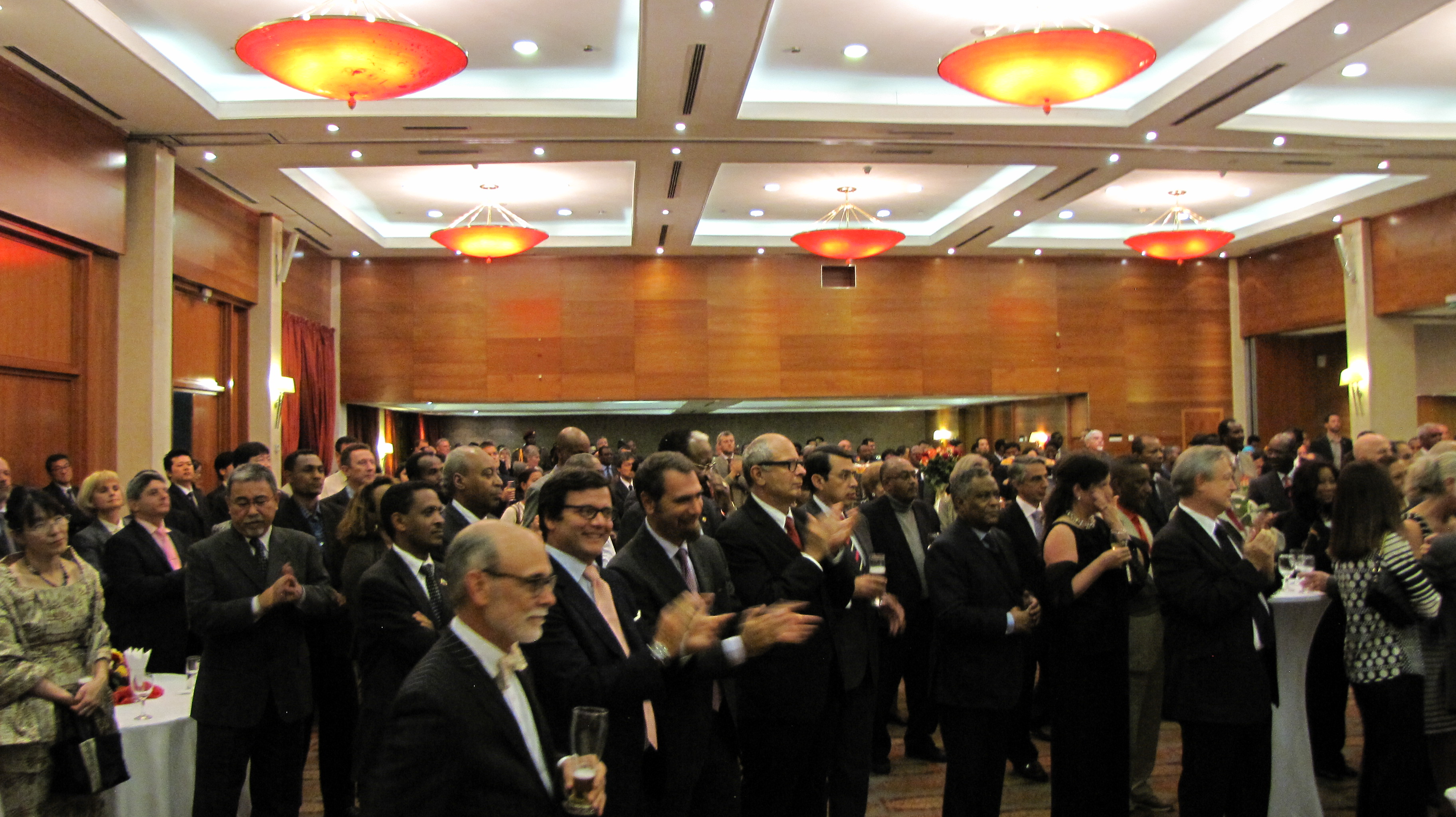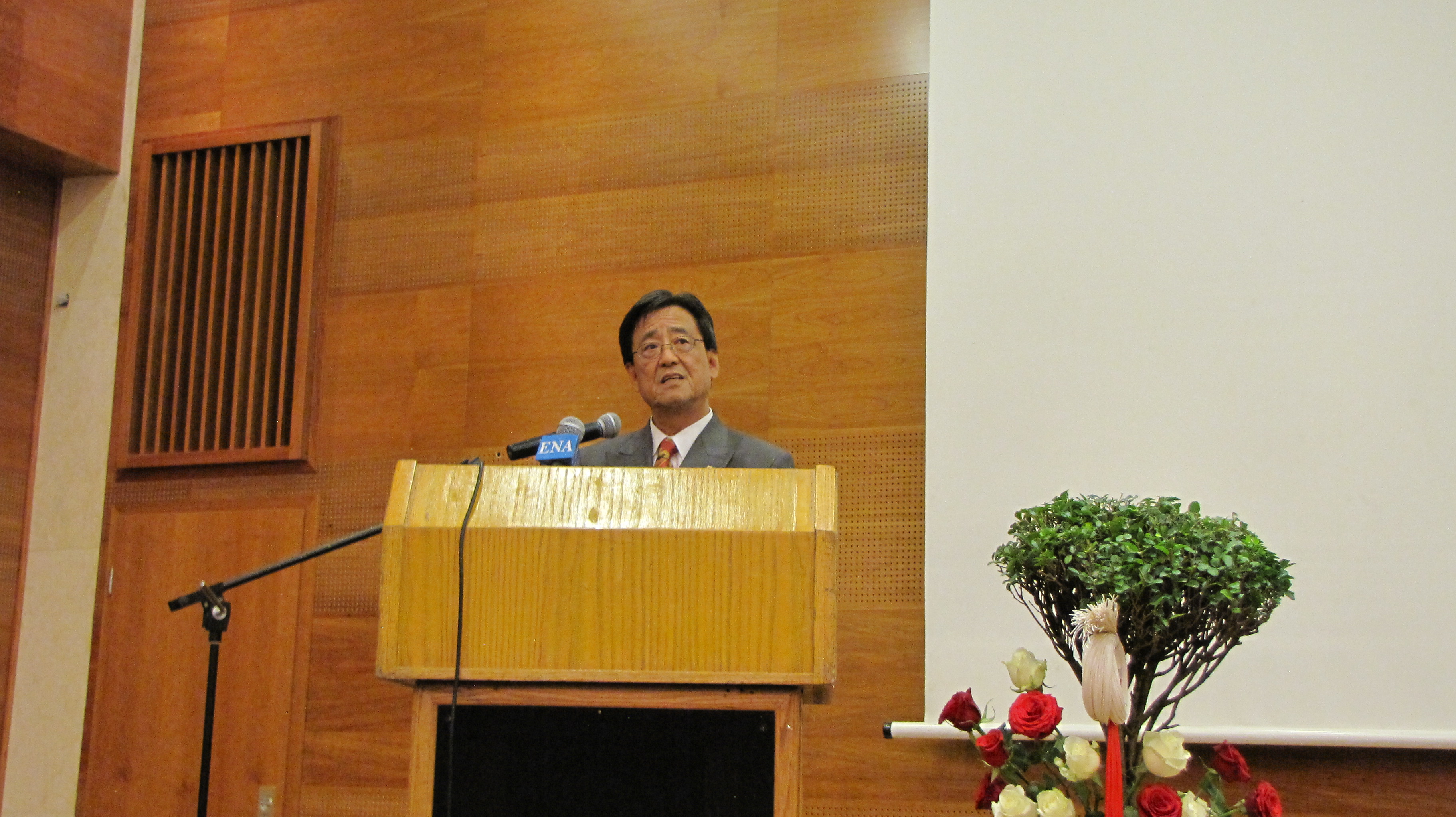|

|
|

|
| Ambassador's Speech>2013 | |||||
|
|||||
At the Farewell Reception at the Hilton Hotel on 20 September, 2013 |
|||||
  |
|||||
Endemen Ameshachehu! Zare meshet bemenakebrew ye shegnet beal lay seletegegnachehu betam amesegenalehu. Guadegnochen ena yesera balderebochegn sesenabet eyazenku new. Gezeyen chereshe ke Addis Ababa bezeh wer mecheresha ehedalehu. Good evening. I am most grateful to all of you for joining us at this farewell reception. Good-byes are a regular part of life for diplomats as we move from country to country and back to our capitals. And departures are a time for reflection. Those of us who have been fortunate enough to be posted to Addis Ababa find that we have been part of a tight-knit, yet expansive community. This is a rarity in the modern world, and it is something I greatly value. All of us here today are part of that community. Therefore, I am very glad to have this opportunity to thank you all for your friendship, support, cooperation and companionable times as we have worked together to achieve our goals. Excellencies, Ladies and Gentlemen, I am pleased to say that during the past three years of my duty, a number of positive developments have taken place in our relations with Ethiopia. Overall, the friendly and cooperative relationship between our two countries remains as strong as ever today. Mutual visits by dignitaries to our respective countries and policy dialogues have been strengthened. I am glad that H.E. Prime Minister Hailemariam Desalegn visited Japan in June to attend TICADV and that he had various fruitful bilateral meetings as well. Secondly, Japan’s development assistance for Ethiopia has further advanced during my days here, both in quantity and quality. Our ODA to Ethiopia increased by more than 70% in just two years, from 6.8 billion yen (78 million USD) in JFY2010 when I assumed my duty, to 11.7 billion yen (141 million USD) in JFY2012. Last year, we revised our ODA policy to Ethiopia to align it with the GTP (Growth and Transformation Plan), placing particular emphasis on food security and industrial development. Infrastructure development and human resource development are also our priority areas. In this regard, Japan’s cooperation with Ethiopia for industrial development is our unique contribution. Through a series of policy dialogue since 2009, we have shared with Ethiopian colleagues our knowledge and experience of industrialization, not only in Japan but in other East Asian countries. Now, our focus will be on a strategy and a roadmap to make Ethiopia the leading industrialized country in Sub-Saharan Africa by 2025 in the labor-intensive, light manufacturing sector. The kaizen initiatives aimed at improving productivity and efficiency, also in their fifth year, have been scaled up to cover major regional states. Our program to improve the quality of science and math education at secondary schools has also been strengthened. All of these will facilitate Ethiopian efforts underway for industrialization. There is one area where I made strenuous efforts but only a few concrete outcomes could be achieved. To be honest, our bilateral business relations are not yet as strong as desired. Yet, some positive movements are emerging. Ethiopian coffee and sesame exports to Japan have been picking up. Indeed, during the first seven months of this year, Ethiopian exports to Japan outstripped its imports from us due to robust coffee exports. This is the first time in recent years. The number of business inquiries our Embassy received doubled during the past year. And one Japanese company is now preparing to establish a factory in Addis Ababa to manufacture leather products for export. The process may be slow, but surely moving forward. Therefore, I am optimistic about the future. Excellencies, Ladies and Gentlemen, The African Union is also an important partner for Japan. It has been a great pleasure for me to work closely with the AU Commission and African ambassadors during a Year of Africa, celebrating the 50th Anniversary of the OAU/AU and the 20th Anniversary of TICAD. 2013 has been a special year for both Japan and Africa. TICADV is the first TICAD meeting we have held with the AU Commission as a co-organizer. Working in a spirit of cooperation and compromise, we achieved a good result. I am most grateful to the Commission, the Chair of the Union and African colleagues for your valuable contribution to this success. Now we are in the follow-up process, based on the mechanisms agreed upon at TICADV. Excellencies, Ladies and Gentlemen, Let me say a few words about my deputy, Minister Kitaoka, who is also leaving Addis Ababa next month. Minister Kitaoka has assisted me greatly, first as the Minister for Economic Affairs and then as the Deputy Chief of Mission. He is one of the most intellectual diplomats in our foreign service and an astute resource person. He has produced many insightful analytical reports on the Ethiopian economy, economic policies, internal politics, African regional integration and so on, which I have valued very much. I wish him all the best in his new assignment in Europe. When I leave Addis Ababa in early October, I will look back on a rewarding and fruitful three years in Ethiopia, and I will take with me many warm memories of the remarkable people I have met here in the course of my duties. Our paths may cross again. Now, I wish you all an enjoyable evening and thank you again for joining us tonight. Betam Amesegenalehu! Thank you very much.
|
|||||